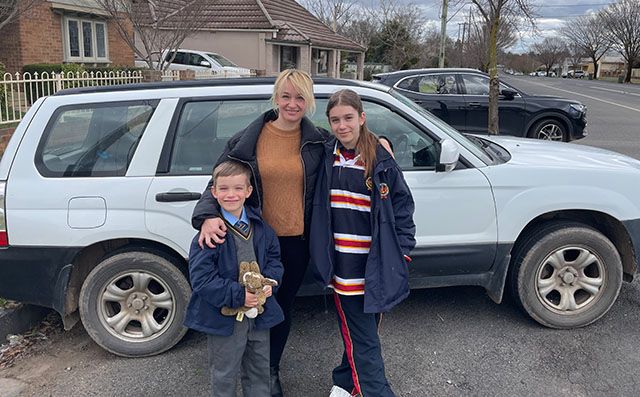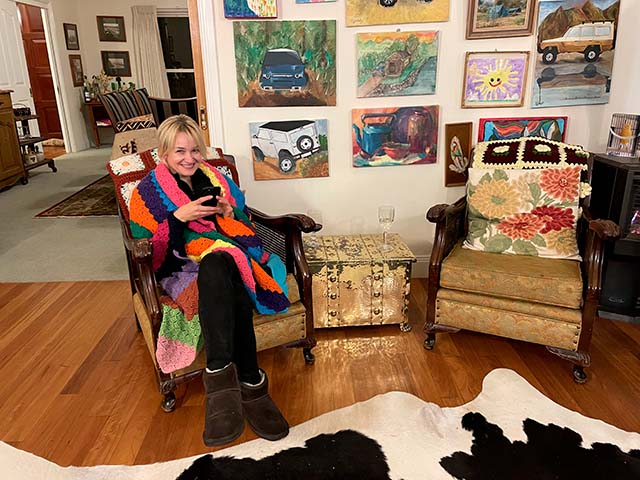With 2 kids and 3 backpacks. Vika's Hordiiko long way from Ukraine to Orange, NSW in the search of safe haven

It was about 5 a.m. 24 February when Vika Hordiiko, 38, Kyiv, woke up from a distant rumble. One shouldn`t be a great predictor to guess what has happened. The last months Russia has been building up its troops around Ukrainian borders, the previous weeks embassies left Ukraine`s capital Kyiv, and according to intelligence analysis, Russians completed the final preparations to a large-scale onslaught like necessary blood supply in their field hospitals.
A cell phone started ringing. Nervous voices of relatives and friends were mixing in a viscous mass of messages from where the only one word sounded awfully clear: War.
Vika went to the children's bedroom, woke her daughter Vladyslava, 13, and son Myroslav, 7 and said that the war had begun.
Since that day Vlada and her kids started their long journey to a safe haven.
First they moved to Western Ukraine that was relatively far from the frontline. Meanwhile, from the very beginning of the war Russia started hitting all the territory of Ukraine with missiles. Initially the main targets were the objects of critical infrastructure, but very soon Russians came to the random shelling that caused countless collateral deaths and aimed to sow fear and panic among civilians.
After hesitations and considerations she decided to go with children to Austria, where her friend had found a temporary shelter in a remote village in the Alps.
But the migrant crisis, which has become the biggest in Europe since World War II, put a huge pressure on the European Union. About 7 millions Ukrainians who stayed in the EU needed accommodation, food, healthcare and, often, financial support – many of them lost everything after their houses and apartments were completely destroyed by Russian missile attacks and air raids. The EU capabilities to welcome more refugees were almost depleted.

One of the first countries outside Europe that opened a sort of emergency relocation program for Ukrainians was Australia. The Government announced that Ukrainian displaced persons who came to the country after February 24, would be granted “safe haven” humanitarian visas. Vika has a friend there, Olha Lyeskakova, who came to Australia in 2017. The combination of these factors led her to an obvious decision: to go to another part of the world in search of safety for her kids and new life. She scheduled family relocation in early autumn, after the rent of the house in Austria expired.
Monday, July 4, Vika woke up early due to a phone call. Olha called her to tell her the abrupt news: the Australian government was closing the humanitarian “safe haven” program on July, 14.
The news stirred up the Ukrainian community both in and outside Australia. A lot of people who had already come to the country, mainly women with children, were waiting for a later reunion with their family members. A lot were just planning to come.
The sudden decision of the Australian government forced them to take immediate actions. Air ticket prices started soaring up whereas hundreds of Ukrainians tried to book a flight to Australia. A ticket that could be booked in advance for 1500 AUD now was twice as expensive. And more. And more.

Finally, Vika booked the 60 hours lasting flight with long connections from Vienna through Abu Dhabi, New Delhi and Bangkok to Sydney for AUD6,500. It should be the first flight for kids – and no one expected such terrible conditions for their first overseas experience.
Meanwhile their travel almost ended in disaster when in Abu Dhabi the representative of Indian air company GO Air did not allow Vika and her children to board, explaining that despite the fact they do not leave the airport in New Delhi, they need to change terminals for another carrier. And they need visas for it. Explanations and pleas did not help. Indian representatives remained indifferent to the problems of people who were fleeing the war.
Non-refundable air tickets were lost. Vika and the kids were stuck in Abu Dhabi with no money, with no possibility to book other tickets either to go to Australia or back to Austria.

Fortunately, Olha had activated all her connections to find immediately an additional 6000 AUD to book last-minute tickets from Abu Dhabi to Melbourne and then Sydney.
On July 12 early morning Vika, Vlada and Myroslav, exhausted and tired, arrived in Australia.
First they settled out in Sydney, having a 4 weeks accommodation from SSI. But for Vika who had no English life in a metropolis like Sydney with its high rent prices could be unaffordable.
Olha, who has been helping Ukrainian displaced persons since the beginning of war, suggested Vika to move to Orange, NSW, where the local community had already welcomed several families from Ukraine.
That's how Vika, Vlada and Myroslav discovered the hospitality of Orange inhabitants. They found a free accomodation at a home of Philippa Waters, a music teacher in James Sheahan Catholic High School, free school enlistments and even a car – the old good Subaru Forester that was gifted to Vika by Judy and Bob Hill.
Moreover, Vika`s extra travel expenses, caused due to Indian unfriendly policy, were covered by Kiwanis Sydney, whose members organized a series of fundraising to support her and her family in Australia. With the help of JobEntry.au Vika also found starter work at a fancy Tonic restaurant in Millthorpe.

Today Vika and her children are safe and happily integrating into a local life. Their long and exhausting run away from the war finally ended in a warm and friendly community of Orange.
Do you want to make a difference for those professionals, who are in need of their first job in Australia?
There are plenty of options to support refugees, new migrants and temporarily displaced people, JobEntry is assisting to.
Contact us now:
© JobEntry. All rights reserved.